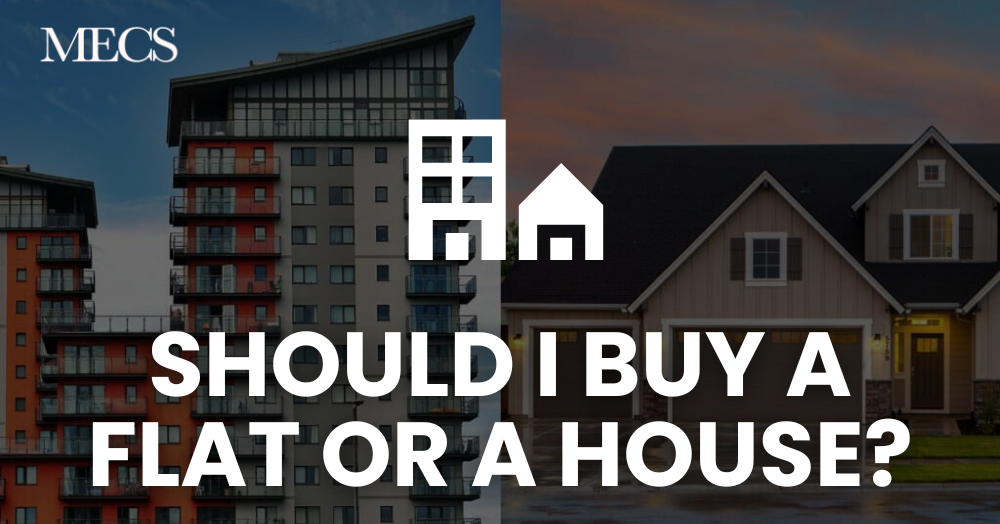Each property type offers a distinct set of advantages and drawbacks that cater to different preferences, budgets, and long-term goals. Whether you're a first-time buyer or a seasoned investor, understanding the unique considerations associated with flats and houses can help you make an informed decision.
The Allure of Flats
Pros:
Affordability:
Flats tend to be more budget-friendly than houses, especially in urban areas where space is limited. They can be an ideal option for first-time buyers or individuals looking to live in central locations without breaking the bank.
Location:
Flats are often situated in City centres or well-connected areas, providing easy access to amenities, public transportation, and cultural attractions. This can be particularly advantageous for individuals who prioritise a vibrant urban lifestyle.
Low Maintenance:
The maintenance responsibilities for flats are typically shared among residents, often covered by service charges or ground rent. This can save you from the burdens of tasks like exterior upkeep and landscaping.
Security:
Many flats offer enhanced security features such as gated entrances, concierge services, and intercom systems. This can offer peace of mind, especially for those concerned about safety.
Amenities:
Some modern flats come with built-in amenities like gyms, swimming pools, and communal lounges. This can contribute to a convenient and comfortable living experience.
Cons:
Limited Space:
Flats generally offer less living space compared to houses. This can become an issue if you have a growing family or require more room for hobbies and activities.
Less Privacy:
Shared walls and proximity to neighbours can result in reduced privacy and increased noise levels. It's important to consider your tolerance for communal living.
Leasehold vs. Freehold:
Many flats are leasehold properties, meaning you don't own the land the building sits on. Leasehold arrangements can come with additional costs and restrictions, so understanding the terms is crucial. Leasehold properties will often have a ground rent that would need to be paid each month to the land owner, on top of any mortgage that you would be paying.
The Allure of Houses
Pros:
Space:
Houses offer more space both indoors and outdoors, making them suitable for families, pet owners, and those who value having ample room for various purposes.
Outdoor Living:
Houses often come with gardens, patios, and outdoor spaces that allow for gardening, recreation, and relaxation. This can be a major advantage for those who enjoy spending time outdoors.
Potential for Expansion:
Houses generally offer more flexibility for future expansions, renovations, and customisations. You have the freedom to adapt the property to your changing needs and preferences.
Privacy:
Detached and semi-detached houses offer greater privacy compared to flats, as you're not sharing walls with neighbours.
Investment Potential:
Houses, especially in desirable locations, tend to appreciate in value over time. This can make them a solid long-term investment.
Cons:
Cost:
Houses are often more expensive than flats, both in terms of the initial purchase price and ongoing maintenance expenses. Additionally, houses in urban areas might come at a premium.
Maintenance:
As a homeowner, you're responsible for all aspects of maintenance, from exterior repairs to landscaping. This requires time, effort, and potentially additional costs.
Location Trade-offs:
Houses with spacious gardens are more likely to be situated in suburban or rural areas, which might not be as well-connected or convenient as urban flat locations.
Limited Urban Lifestyle:
If you prefer the hustle and bustle of city life, a house in the suburbs might not provide the same level of access to cultural and entertainment options.
Making Your Choice
When deciding between a flat and a house, it's essential to evaluate your current and future needs, lifestyle preferences, budget constraints, and investment goals. There's no one-size-fits-all answer; what matters most is finding a property that aligns with your unique circumstances and aspirations.
Take the time to research local property markets, visit potential homes, and consult with professionals like real estate agents and financial advisors to ensure that your choice is well-informed and aligned with your long-term plans.
Whether you choose the cosmopolitan convenience of a flat or the spacious serenity of a house, we have the perfect property for you, so get in contact now.
0121 681 6327
info@mecsproperty.co.uk

